45% of Americans approve of Trump's handling of North Korea, a bump of 8 points since December
Donald Trump has made a point of keeping many of his campaign promises, whether or not Americans approve. He has withdrawn from the Paris climate agreement and the Trans-Pacific Partnership, signed a tax cut bill, and now, ended US participation in the multi-nation Iran nuclear agreement. The latest Economist/YouGov Poll was conducted before Tuesday’s announcement of the US leaving the Iran pact, so it can’t measure reaction to it (though beforehand, more wanted America to remain than to leave that deal).
Nevertheless, the poll brings some positive gains for the President in public opinion. Nearly as many this week approve as disapprove of his performance in office, something that hasn’t happened since the beginning of his administration – 42% approve, 45% do not.
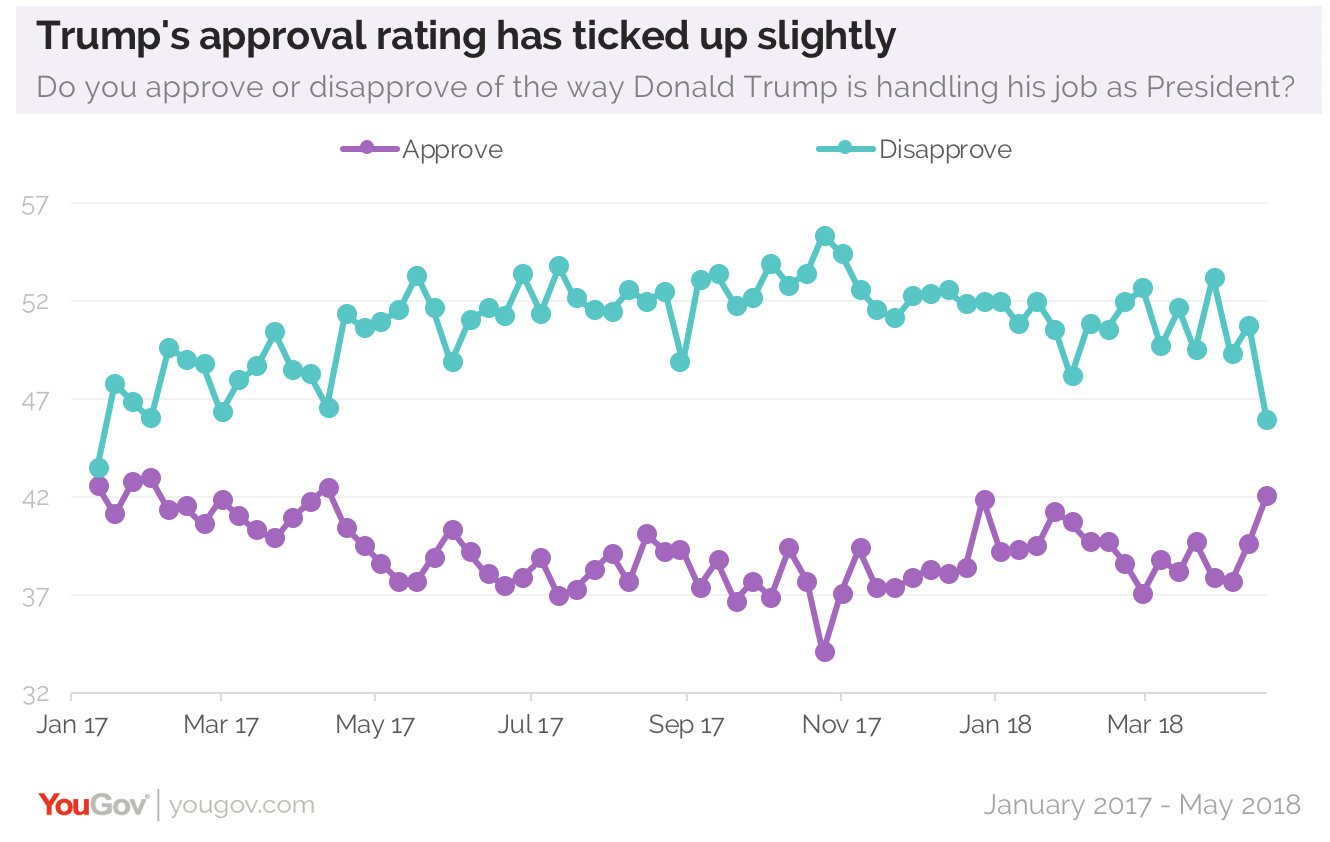 But that improvement may not have been due solely to how people judge the President’s actions. There are larger factors that may have a greater impact. There is an overall drop in pessimism, something that hasn’t happened since the beginning of the Trump Administration. Just under half the public today believes the country is on the wrong track. But there remains more pessimism than optimism (as there has been for more than a decade). 36% today say the country is headed in the right direction, 49% disagree.
But that improvement may not have been due solely to how people judge the President’s actions. There are larger factors that may have a greater impact. There is an overall drop in pessimism, something that hasn’t happened since the beginning of the Trump Administration. Just under half the public today believes the country is on the wrong track. But there remains more pessimism than optimism (as there has been for more than a decade). 36% today say the country is headed in the right direction, 49% disagree.
Americans have noticed the continued improvement in the state of the economy. On Friday, the unemployment rate dropped to 3.9%, its lowest rate in nearly 20 years. (It was 3.9% in the last quarter of 2000). This shifted how Americans view the economy. Last week, nearly as many thought the economy was getting worse as getting better. This week, the optimists clearly outnumber the pessimists.
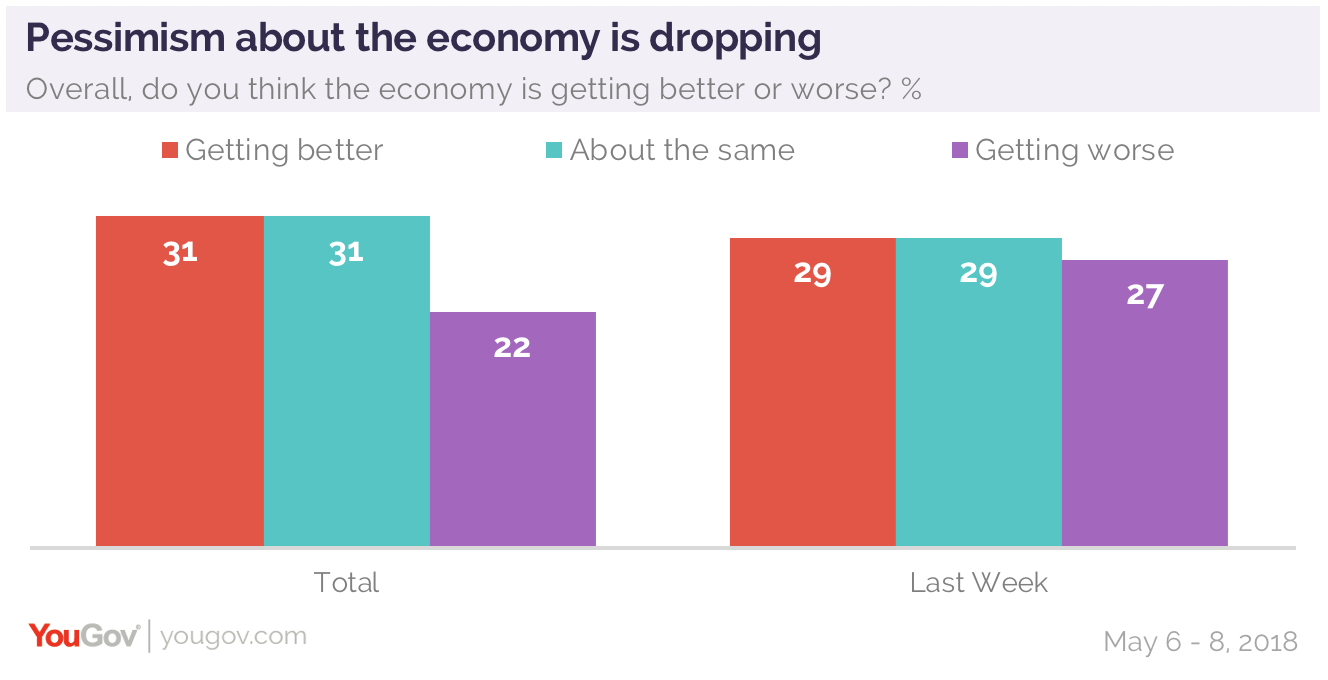 However, this has not yet translated into Americans seeing improvement in their own family’s situation. Only 21% say their family arebetter off financially than they were a year ago, and nearly the same percentage, 20%, say they are worse off. More, 49% say things haven’t changed much for them.
However, this has not yet translated into Americans seeing improvement in their own family’s situation. Only 21% say their family arebetter off financially than they were a year ago, and nearly the same percentage, 20%, say they are worse off. More, 49% say things haven’t changed much for them.
Even most Republicans are not yet seeing much change in their own finances. 63% of Republicans believe the economy is getting better, but just 36% believe their own family’s financial status is better than it was a year ago. Few Republicans think it has gotten worse.
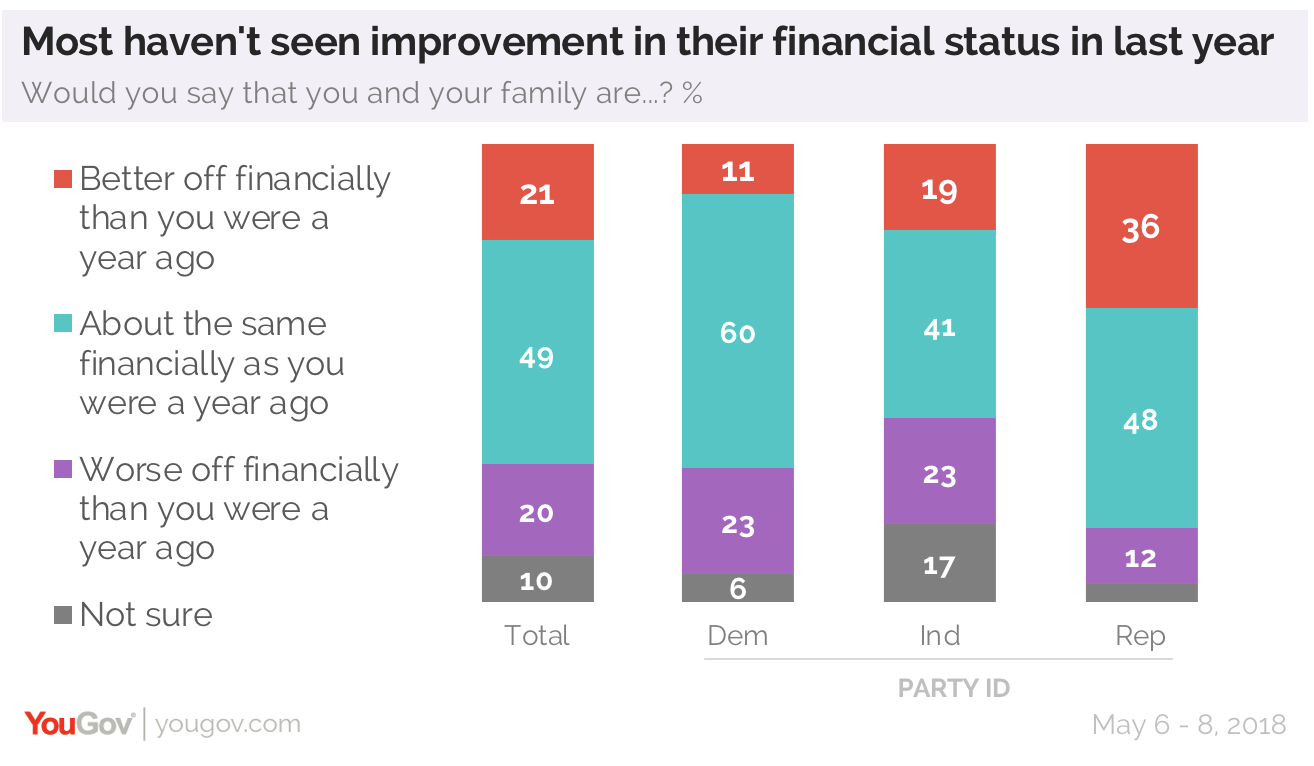 Good economic news is clearly boosting economic assessments and optimism, and helps the President get positive marks for how he is managing the economy (and for his job overall). The tax bill, the President’s signature economic legislation, continues to divide the country. 35% support that law, 33% do not. But when asked how the President is handling the economy, the results are clearly positive. This week, 45% approve, and 38% disapprove – President Trump’s best rating in three months.
Good economic news is clearly boosting economic assessments and optimism, and helps the President get positive marks for how he is managing the economy (and for his job overall). The tax bill, the President’s signature economic legislation, continues to divide the country. 35% support that law, 33% do not. But when asked how the President is handling the economy, the results are clearly positive. This week, 45% approve, and 38% disapprove – President Trump’s best rating in three months.
If good economic news is boosting assessments of the President and the future, so is one foreign policy area that also may be beyond the President’s control – the possibility of a major shift in relations between the United and North Korea. There is overwhelming public support for direct talks with North Korean leader Kim Jong-un, with Republicans the most enthusiastic. Only 9% overall oppose talks. The President receives good marks for how he is handling North Korea
This week’s rating is even higher than the positive assessment Americans had last week, and is a reversal from last year, when President Trump engaged in a war of insults with the North Korean leader. Then, far more disapproved than approved. There is growing hope, though many are still skeptical, that a Trump-Kim meeting will be a step forward to peace. For this first time, more say a meeting will be an important step forward than believe any meeting will be mostly for show. 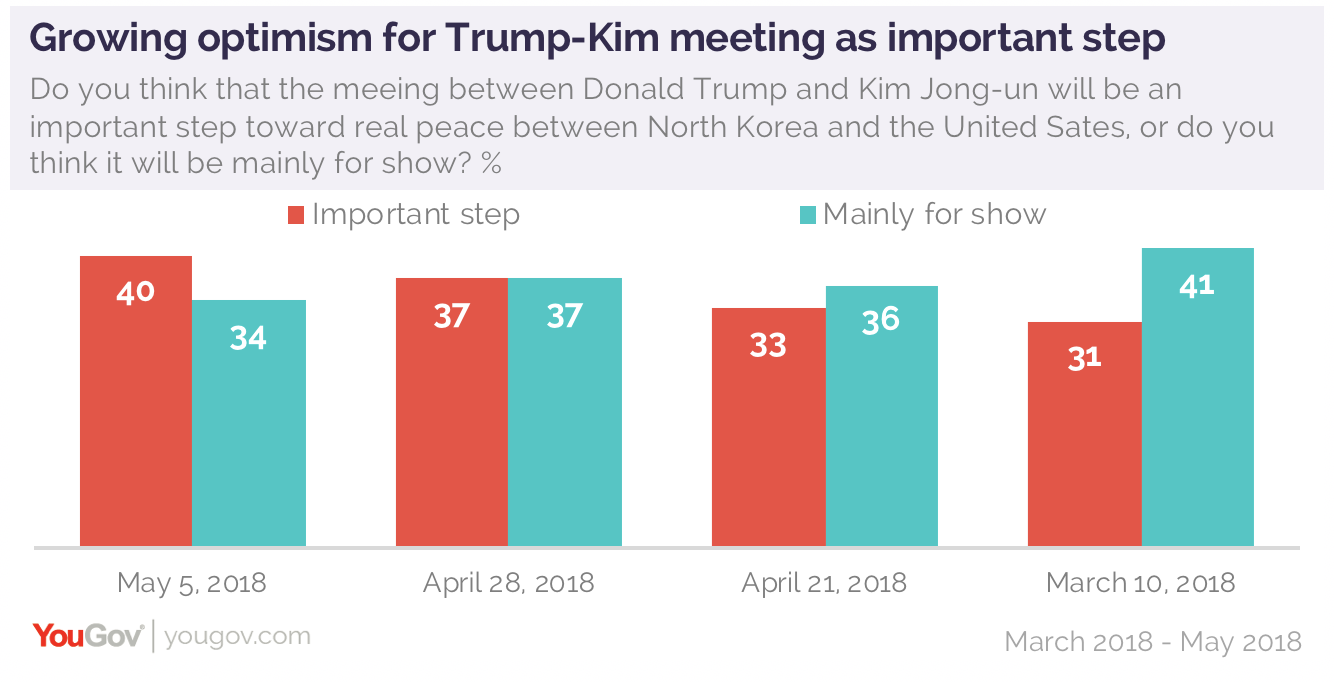 The worry that President Trump might get the country into a war has also declined. Although just under half (49%) believe that is a likely possibility, that is a lower percentage than ever for this President. 34% – the highest percentage ever – say the President is unlikely to get the US into a war.
The worry that President Trump might get the country into a war has also declined. Although just under half (49%) believe that is a likely possibility, that is a lower percentage than ever for this President. 34% – the highest percentage ever – say the President is unlikely to get the US into a war. 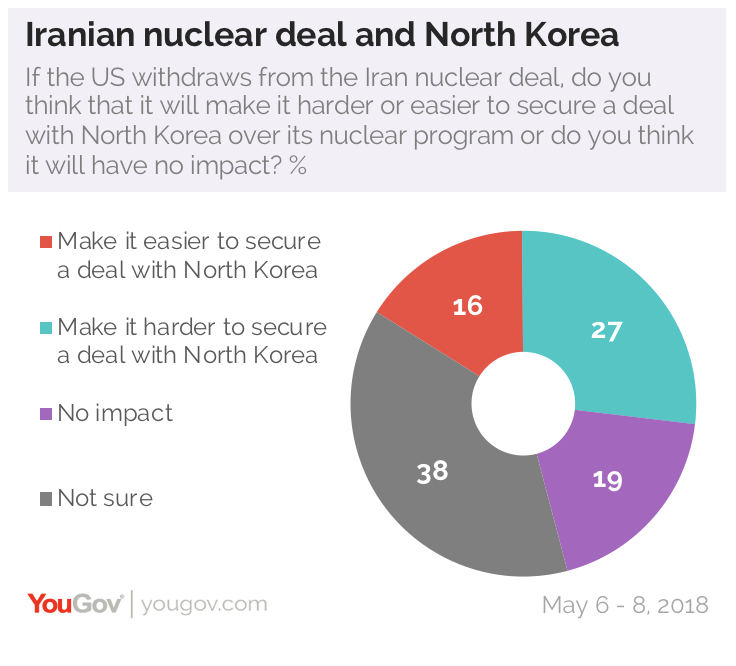
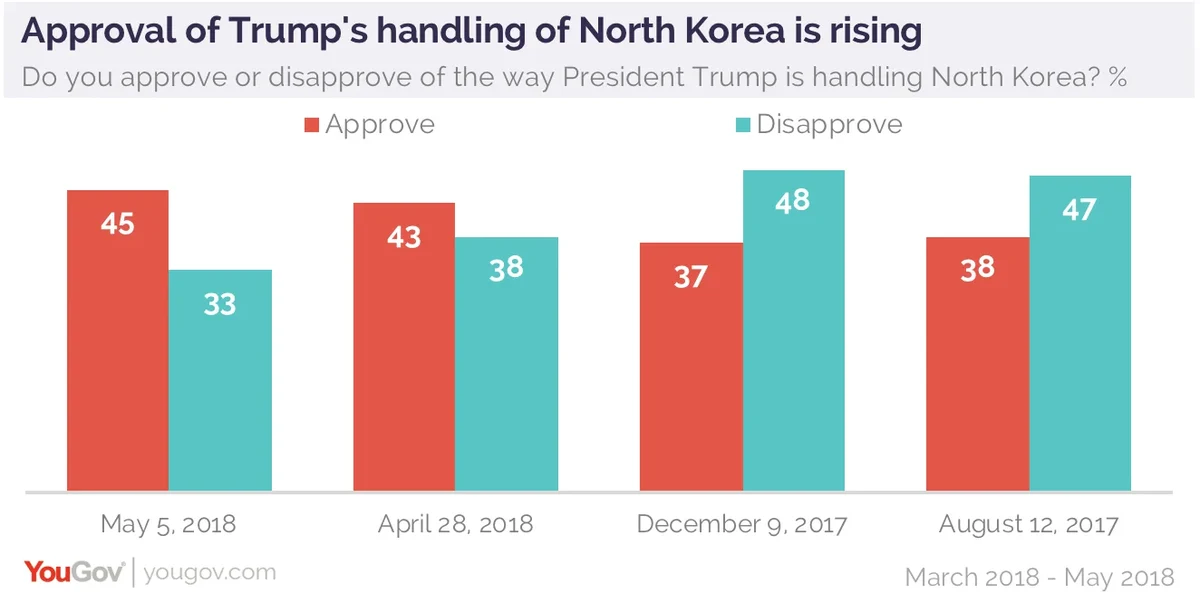
Of course, success in North Korea is not entirely in the President’s hands. Most still see North Korea’s nuclear program as a threat to the United States, though just one in four perceive it as an immediate and serious threat. There is also some concern that the withdrawal from the Iran agreement could have a negative impact on North Korean negotiations. More say it will make it harder to achieve an agreement than think it will make it easier. But many aren’t sure whether or not it will matter.
Read more toplines and tables results here
Photo: Getty









